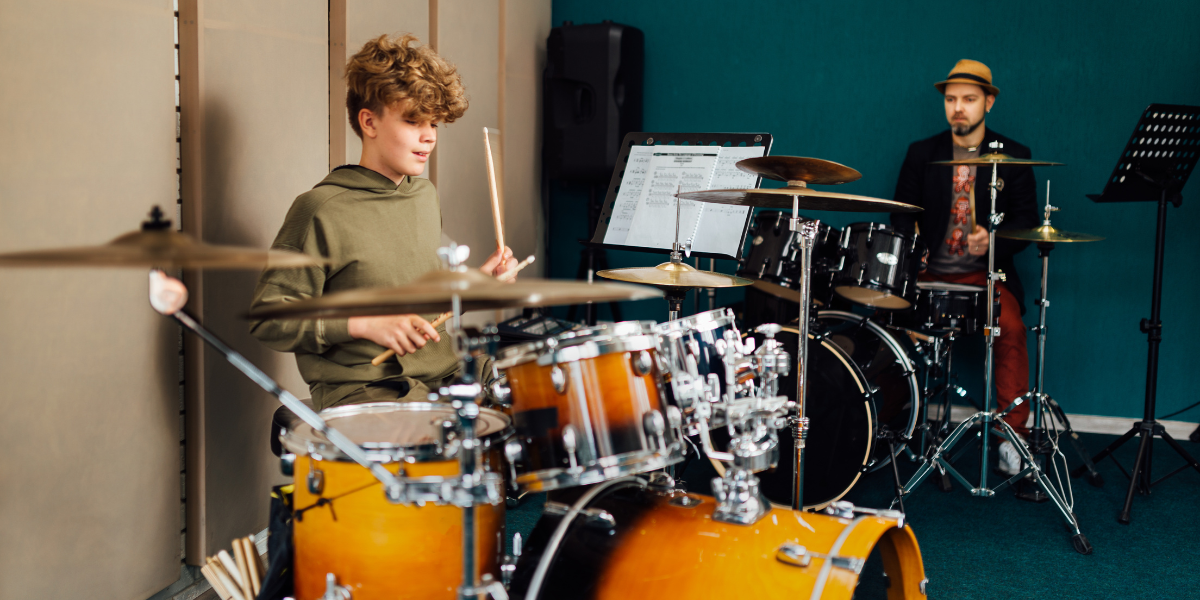Drum Lessons at Home for Kids: What Parents Need to Know
Drums are loud, energetic, and let’s face it fun. If your child is always tapping on the table, banging pots and pans, or drumming along to songs on the radio, they might be ready for something more structured: drum lessons at home. Let’s break down everything you need to know before signing your child up for drum lessons in the comfort of your own home.
Why Choose Drum Lessons at Home?
There are plenty of good reasons why parents are choosing at home music lessons over in-studio classes.
1. Convenience for Busy Families
We all know what it’s like to juggle school drop-offs, work, after-school activities, and dinner. Having a music teacher come to your home eliminates the stress of commuting to another location and gives your child more time to relax and focus on learning.
2. Familiar Environment
Learning in a familiar space can help kids feel more comfortable and confident. They’re less likely to be shy or distracted, and more likely to engage fully with their teacher. Plus, you get to be nearby to support and observe their progress.
3. Personalized Lessons
Drum lessons at home are usually one-on-one, which means the teacher can tailor each session to your child’s unique learning style, pace, and musical taste. This keeps them motivated and engaged and helps them progress faster.

What Age Can Kids Start Learning Drums?
Most kids can start learning the basics of drumming as early as age 5 or 6. At this age, they have the motor skills and attention span to handle short lessons and basic rhythms.
That said, every child is different. Some may be ready a bit earlier or later. A good teacher will be able to assess your child’s readiness and adjust the lessons accordingly.
Do I Need to Buy a Drum Set?
This is one of the most common concerns parents have. The short answer is: not right away.
When starting out, your child doesn’t need a full professional drum kit. Many beginners start with:
- A practice pad (for learning rhythms and technique)
- Drumsticks
- A metronome or app to keep time
As your child progresses and shows genuine interest, you can consider investing in:
- A digital drum kit: Great for quieter practice and smaller spaces
- An acoustic drum set: Offers the full experience and sound (but it’s louder)
Your drum teacher can guide you on what to buy and when, based on your child’s progress.
How Loud Will It Be?
Let’s be honest drums aren’t the quietest instrument. But there are ways to manage the volume, especially in a home setting.
Here are a few options:
- Use a practice pad: These are much quieter than real drums and perfect for beginners
- Choose a digital drum kit with headphones: Your child hears the drums, but the rest of the house doesn’t
- Add drum mutes or dampening pads to an acoustic kit to soften the sound
Many parents are surprised by how manageable the noise can be once they explore these options.
What Will My Child Learn?
Drum lessons for kids are more than just learning to hit things in time. A good drum teacher will introduce your child to:
- Basic rhythm and timing
- Drumstick grip and posture
- Reading simple drum notation
- Playing along with songs
- Creativity and improvisation
- Listening and collaboration skills
Most importantly, they’ll have fun while building discipline and confidence skills that carry over into school and life.
How to Choose the Right Drum Teacher
When it comes to drum lessons at home, the teacher makes all the difference. Here’s what to look for:
1. Experience with Kids
Not all musicians are natural teachers, especially when it comes to young children. Look for someone who has experience working with kids and knows how to make lessons fun and age-appropriate.
2. Musical Background
Your teacher doesn’t need to be a rock star (though that’s always cool), but they should have a solid foundation in rhythm, technique, and music theory.
3. Teaching Style
Some kids respond best to structured lessons, while others need a more playful approach. A great teacher can read the room and adapt their style to your child’s needs.
4. Reliability
Since the lessons are happening in your home, it’s important to find someone professional, punctual, and respectful of your space and time.
Many reputable music schools offer at home music lessons and do all the vetting for you, making the process stress-free. One such example is Elite Music Academy, which provides quality in-home drum instruction from trained professionals.
How Often Should Lessons Be?
Most kids start with one 30- to 45-minute lesson per week. This gives them enough time to learn something new and practice between sessions without feeling overwhelmed.
As they get more serious, you might consider longer lessons or more frequent sessions but once a week is perfect for most beginners.
How Can I Support My Child’s Progress?
You don’t have to be a musician to help your child thrive in their drum lessons at home. Here’s how you can help:
- Encourage regular practice (even 10-15 minutes a day makes a big difference)
- Create a practice-friendly space free from distractions
- Celebrate small wins to keep their confidence high
- Be patient progress takes time, especially in the beginning
And most of all, show interest. Ask them to teach you a rhythm or play you a beat they just learned. When kids feel supported, they’re more likely to stick with it.
Conclusion
Drum lessons at home are a great way for kids to explore their creativity, improve coordination, and develop a lifelong love of music. With the right teacher and a supportive environment, they can learn at their own pace and have a blast doing it. Whether your child dreams of being in a band or just wants a fun hobby, starting with at home music lessons is a smart, flexible, and rewarding choice. Ready to get started? Grab some sticks, clear a little space, and let the rhythm begin.


